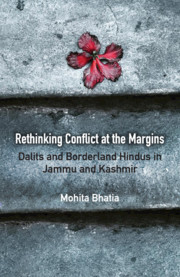Book contents
- Frontmatter
- Contents
- List of Figures and Tables
- Preface
- Acknowledgements
- 1 Introduction
- 2 Regional Diversities and the Conflict
- 3 Caste, Everyday Life and Conflict Politics
- 4 Border Realities: Contesting Hegemonic Paradigms of Nationalism and Conflict
- 5 Contesting the Homogenised Discourse of Religious Identities
- 6 Conclusion
- Glossary
- Bibliography
- Index
4 - Border Realities: Contesting Hegemonic Paradigms of Nationalism and Conflict
Published online by Cambridge University Press: 30 April 2020
- Frontmatter
- Contents
- List of Figures and Tables
- Preface
- Acknowledgements
- 1 Introduction
- 2 Regional Diversities and the Conflict
- 3 Caste, Everyday Life and Conflict Politics
- 4 Border Realities: Contesting Hegemonic Paradigms of Nationalism and Conflict
- 5 Contesting the Homogenised Discourse of Religious Identities
- 6 Conclusion
- Glossary
- Bibliography
- Index
Summary
Introduction
This chapter intends to reframe the narrative of the Jammu and Kashmir conflict by foregrounding the lived experiences of people residing in the border belt of Jammu. These experiences are in many ways integrally entwined to the wider conflict situation, but have not found any significant place in the accounts or political dialogues related to the dispute. This chapter will lay out the sociocultural and security settings of the border zone of Jammu, particularly the Rajouri region that adjoins the Line of Control (LOC). It will then illustrate how the conflict has influenced the border formation processes, starting from the partition of the state to the numerous wars that were fought between India and Pakistan. These incidents have divided families and shaped the memories as well as political responses of border residents in complex ways. Focussing on this LOC, the chapter will explore the border not just as a territorial reality but also as a living and changing one that unsettles the static ways in which the conflict chronicle is often defined and negotiated.
The Line of Control and Its Dilemmas
I have an emotional attachment to the areas across the border [Khuiratta village in Pakistan-administered Jammu and Kashmir] in Pakistan as during the 1947 chaos I had to migrate and take refuge there. I stayed there for 10 years. Some of my relatives are still there. I keep track of happenings in Pakistan through news, and I pray for people there – people who helped me, who took care of me, and my relatives whom I miss. But Rajouri is my birth place; my village in Rajouri is my ‘mulk’ (country), my ‘watan’ (country), my love. I could not settle in Pakistan and came back as I was born in India, in Rajouri and that is where I want to die.
– WasimWasim is an aged Muslim resident of the border district of Rajouri and his reflections provide perspective on the real-life complexities of people living in regions adjoining the LOC. Wasim's emotional affection towards his village in Rajouri co-exists with his attachment to Khuiratta village and other areas that lie in Pakistan-administered Jammu and Kashmir (PAJK). Despite his awareness of a concrete and almost impermeable border between India and Pakistan, his mind visualises no closure but in fact a continuity and interrelatedness between the two sides of the LOC.
- Type
- Chapter
- Information
- Rethinking Conflict at the MarginsDalits and Borderland Hindus in Jammu and Kashmir, pp. 67 - 103Publisher: Cambridge University PressPrint publication year: 2020



